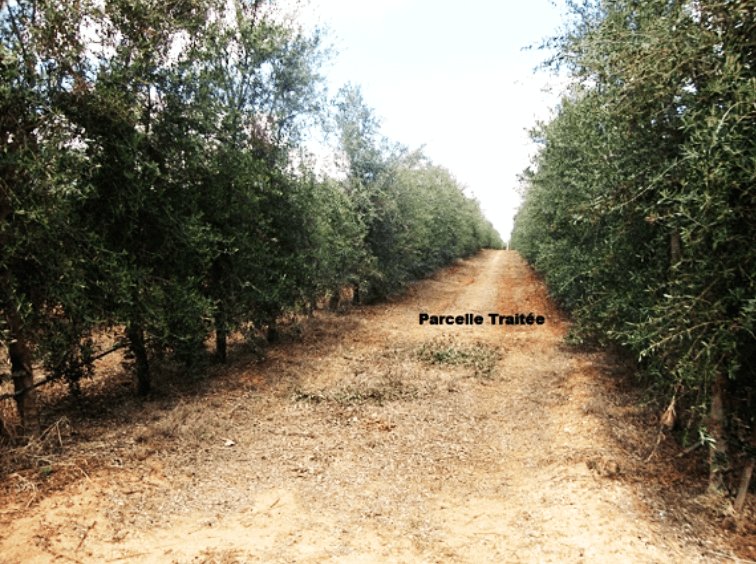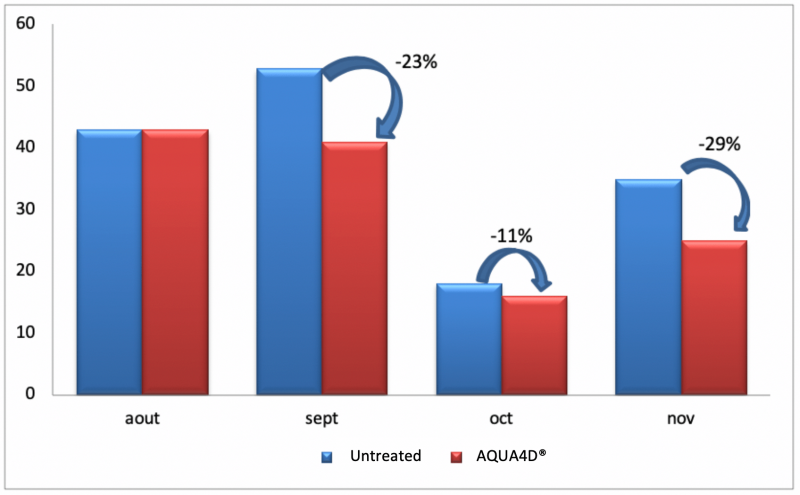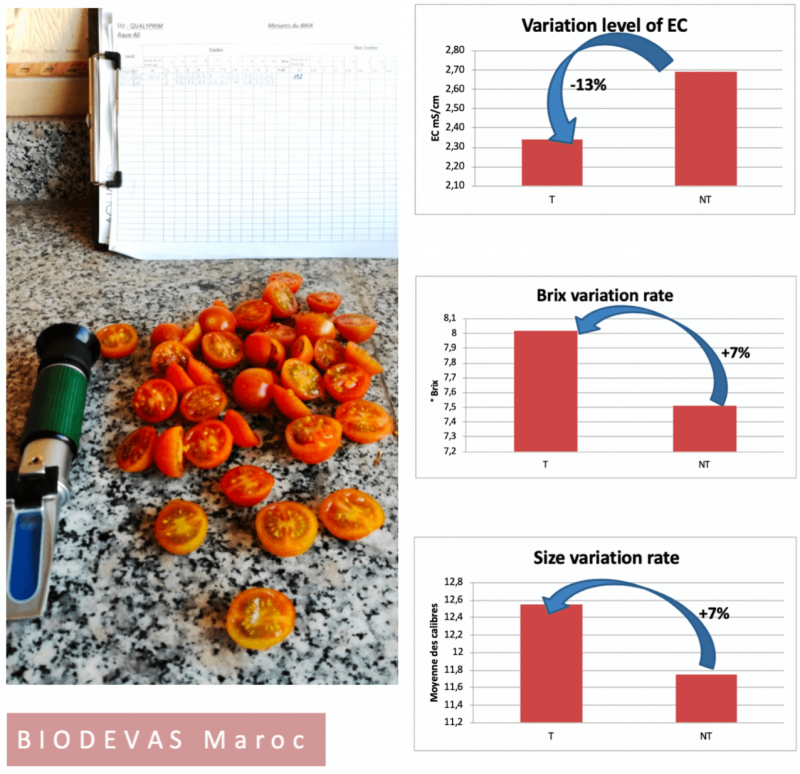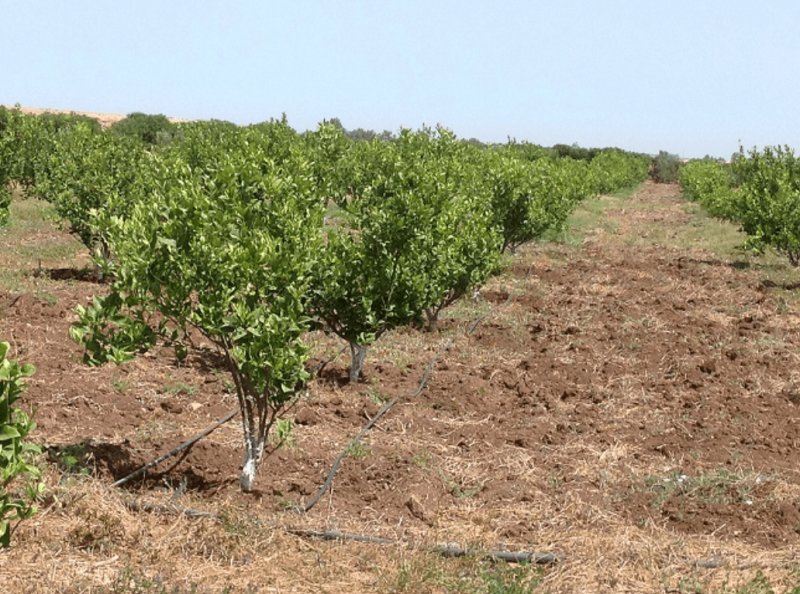Like many countries in North Africa, Morocco is faced with increasing water scarcity and drought. 2020 has seen the country tackling not only Covid-19 but also an unwelcome mix of unusually high temperatures and low rainfall. This has led to predictions of another unproductive year for Moroccan agriculture. Thankfully, as in other water-scarce regions, help is at hand thanks to the growth of efficiency-boosting innovations in agtech.
Confronting the biggest challenges in agriculture
Since 2005, Switzerland’s AQUA4D have been dedicated to putting their technology to use where it is most needed, namely in improving our relationship with water and dealing with some of the most persistent problems in irrigated agriculture. This water-smart innovation works with very low frequency (VLF) resonance fields which change the physical structure of water itself, without using chemicals. This sustainably improves the biological life of the soil, improves plant health, and allows to continue irrigation even with poor quality or saline water. Various scientific studies have shown that AQUA4D®-treated water more easily infiltrates the micropores of the soil, increasing water retention, and thus leading to less frequent irrigation (and hence double-digit water savings). The following graphic illustrates this process:

This same treatment also acts on minerals in the water, meaning i) nutrients can be more effectively absorbed by the plant and ii) salts no longer crystallize on the surface – they are leached below the rhizosphere out of harm’s way. Alongside the moister soils mentioned above, this has knock-on effects on the plants, as they are no longer hindered by excess salts: they can flourish to their full potential, with more hairy roots and more vegetative growth.
Academically verified, globally deployed
In early 2020, Mohamed Hachicha and colleagues from INRGREF (University of Carthage), and INRAE, France, published a paper which looked precisely at the changes AQUA4D® produces in soil structure. The randomized experiment was performed on barley crops spread across 24 pots with reconstituted soil comprising 26% clay, 44% silt, and 30% sand. Half the plants were irrigated using untreated water, and half using AQUA4D®. The results showed that AQUA4D®-treated water led to increased porosity and improvement in soil structure, at both a macroscopic and microscopic scale. The paper’s author noted that AQUA4D® treatment “caused larger pores to form, which led to stronger soil hydraulic conductivity and a consequent increase in drainage… These changes modify the soil as a habitat and thus improve the biological activity of soil flora and fauna.”
These lab-based results thus replicated the positive effects observed by a multitude of real-world growers, including several recent projects in Morocco.
Let’s take a look at some of these projects in which AQUA4D has successfully overcome long-standing irrigation problems.
Water savings in Meknes: Olive trees
Struggling with access to irrigation water, this olive grower in Meknes decided to work with the AQUA4D® system to see if it could help them economize on their water use. To measure the results, two identical plots of Koroneiki olives were chosen, irrigated with a flow rate of 21.6 m3/h.

The plots were measures with 3x Watermark tensiometers and the data read daily at 1pm. The figures from August to November showed consistently less water required for irrigation, as the soils were now staying moister for longer:

Mohamed Elaissi from Biodevas Maroc was the horticultural expert in charge of the research. He observed: “It can be concluded that the AQUA4D system has effectively proven its ability to save consumption of irrigation water, with recorded decreases varying between -11% and -29%.”

Salinity solved in Agadir: Cherry tomatoes
This large-scale greenhouse in Sidi Bibi cultivates soillessly (coconut substrate) and had optimized many processes in recent years, but still faced the problem of water with high EC (2.5 mS/cm). AQUA4D® was contracted to overcome this issue while still using the same water source. At the same time, a comparative study was carried out to check the effect on EC, fruit weight and Brix degree. Results showed a 13% decrease in EC, which had knock-on effects on the fruits: the treated tomatoes had a 7% higher Brix rate and were on also on average 7% larger.

As a consequence of all this, the increased yield gains from the AQUA4D® system were estimated at an astonishing +7322 kg per hectare, bringing a Return on Investment in 4 months.
Increased yields in Settat: Lemons
When the owner of this plantation started planting his lemon trees, he was advised against it due to the poor water source water and salinity issues. Nevertheless, he was sure there was a solution out there, and a search brought him to AQUA4D and Morocco-based Mohamed Elaissi.

The irrigation water was indeed poor quality, with an EC of 3.51 mS/cm, and containing 18.6 mEq/L of Sodium and 18.8 mEq/L of Chlorine. However, treatment with AQUA4D was able to reduce these numbers to manageable amounts (see above and here for more details).
The effects on productivity were astonishing. Before installation, yield per tree was a mere 15 kg. The latest results showed 60 kg yields from 7-year-old trees, in addition to the total absence of leaf scorching or crystallization of salts at ground level. Elaissi comments: “On my last visit, the grower told me that he has made his plantation profitable and that it is starting to generate significant profits.”
Conclusion
AQUA4D’s proven results from a wide variety of crops in Morocco show this water-smart innovation has huge potential to overcome salinity and water shortage issues in the country. Furthermore, these solutions can be attained all while providing growers with a fast Return on Investment – an important aspect in these uncertain times.
In the words of Prof. Hachicha et al from INRGREF (University of Carthage), “In the context of modern, organic and sustainable agriculture, we recommend AQUA4D® because it is considered a valuable, safe, practical and economical technology.”
More information:
Mohamed ELAISSI: https://biodevas.fr/, LinkedIn
North Africa
Morocco
Water Efficiency
Sustainable Agriculture

Solving salinity in these lemon trees led to increased yields of 60kg per tree
AQUA4D on Switzerland’s Le Temps


